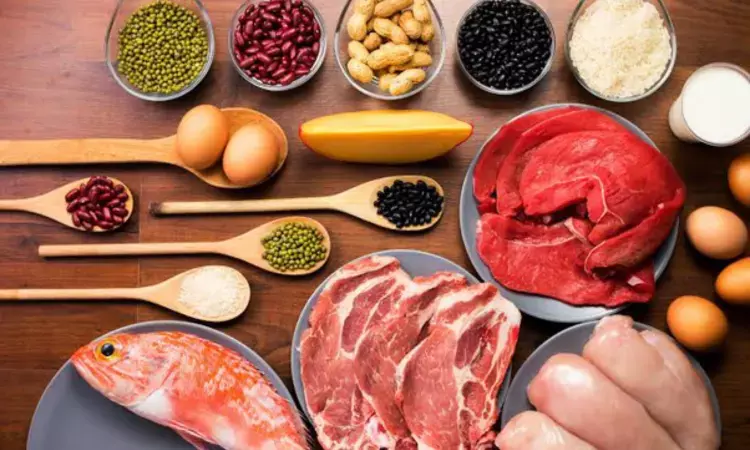- Home
- Medical news & Guidelines
- Anesthesiology
- Cardiology and CTVS
- Critical Care
- Dentistry
- Dermatology
- Diabetes and Endocrinology
- ENT
- Gastroenterology
- Medicine
- Nephrology
- Neurology
- Obstretics-Gynaecology
- Oncology
- Ophthalmology
- Orthopaedics
- Pediatrics-Neonatology
- Psychiatry
- Pulmonology
- Radiology
- Surgery
- Urology
- Laboratory Medicine
- Diet
- Nursing
- Paramedical
- Physiotherapy
- Health news
- Fact Check
- Bone Health Fact Check
- Brain Health Fact Check
- Cancer Related Fact Check
- Child Care Fact Check
- Dental and oral health fact check
- Diabetes and metabolic health fact check
- Diet and Nutrition Fact Check
- Eye and ENT Care Fact Check
- Fitness fact check
- Gut health fact check
- Heart health fact check
- Kidney health fact check
- Medical education fact check
- Men's health fact check
- Respiratory fact check
- Skin and hair care fact check
- Vaccine and Immunization fact check
- Women's health fact check
- AYUSH
- State News
- Andaman and Nicobar Islands
- Andhra Pradesh
- Arunachal Pradesh
- Assam
- Bihar
- Chandigarh
- Chattisgarh
- Dadra and Nagar Haveli
- Daman and Diu
- Delhi
- Goa
- Gujarat
- Haryana
- Himachal Pradesh
- Jammu & Kashmir
- Jharkhand
- Karnataka
- Kerala
- Ladakh
- Lakshadweep
- Madhya Pradesh
- Maharashtra
- Manipur
- Meghalaya
- Mizoram
- Nagaland
- Odisha
- Puducherry
- Punjab
- Rajasthan
- Sikkim
- Tamil Nadu
- Telangana
- Tripura
- Uttar Pradesh
- Uttrakhand
- West Bengal
- Medical Education
- Industry
Fish-related metabolite tied to lower risk of chronic kidney disease: Study

USA: A recent study published in the Kidney Medicine journal showed that fish-related metabolite 1-docosahexaenoylglycerophosphocholine is associated with a reduced risk of chronic kidney disease (CKD).
The study found that protein metabolites found in nuts, fish, legumes, red and processed meat, poultry and eggs are associated with lower risks of chronic kidney disease, with fish having the most protective effect. "These metabolites are candidate biomarkers of dietary intake and may be critical for the primary prevention of CKD," the researchers write.
The finding supports the recent nutritional guidelines recommending a Mediterranean diet, which includes fish as the main dietary protein source.
The urine excretion of nitrogen estimates the total protein intake, but biomarkers of specific dietary protein sources have been sparsely studied. Using untargeted metabolomics, Casey M. Rebholz, Department of Epidemiology, Johns Hopkins Bloomberg School of Public Health, Baltimore, MD, and colleagues aimed to study serum metabolomic markers of 6 protein-rich foods and to investigate whether dietary protein–related metabolites are associated with incident CKD in a prospective cohort study.
The study included 3,726 participants from the Atherosclerosis Risk in Communities study without CKD at baseline. Exposures were dietary intake of 6 protein-rich foods (fish, legumes, nuts, red and processed meat, poultry, and egg), and serum metabolites.
The primary outcome was incident chronic kidney disease defined as estimated glomerular filtration rate (eGFR) < 60 mL/min/1.73 m2 with ≥25% eGFR decline relative to visit 1, hospitalization or death related to CKD, or end-stage kidney disease.
Cross-sectional associations between protein-rich foods and serum metabolites were estimated by multivariable linear regression models. C statistics assessed the metabolites' ability to improve the discrimination of highest versus lowest three quartiles of intake of protein-rich foods beyond covariates (clinical factors, demographics, intake of nonprotein food groups, and health behaviours). Cox regression models identified prospective associations between protein-related metabolites and incident chronic kidney disease.
The researchers reported the following findings:
· 30 significant associations were identified between protein-rich foods and serum metabolites (fish, n = 8; nuts, n = 5; legumes, n = 0; red and processed meat, n = 5; eggs, n = 3; and poultry, n = 9).
· Metabolites collectively and significantly improved the discrimination of a high intake of protein-rich foods compared with covariates alone (difference in C statistics = 0.051, 0.033, 0.003, 0.024, and 0.025 for nuts, fish, red and processed meat, eggs, and poultry-related metabolites, respectively).
· Dietary intake of fish was positively associated with 1-docosahexaenoylglycerophosphocholine (22:6n3), which was inversely associated with incident CKD (HR, 0.82).
To conclude, the researchers identified 30 associations between protein-rich foods and serum metabolites, including 8 associations that were substantiated by prior studies (CMPF, EPA, DHA, 4-vinylphenol sulfate, tryptophan betaine, 3-methylhistidine, ectoine, and creatine). Metabolites individually and collectively had a strong discrimination value for the dietary intake of protein-rich foods, especially CMPF, DHA, tryptophan betaine, 4-vinylphenol sulfate, 3-methylhistidine, and DPA. These metabolites improved the discrimination of the dietary intake of proteins beyond covariates (clinical factors, demographics, intake of nonprotein food groups, and health behaviours).
"One fish-related metabolite (1-docosahexaenoyl-GPC [22:6n3]) was linked inversely with incident CKD risk," the researchers wrote. "These metabolites are candidate biomarkers of dietary intake, and 1-docosahexaenoyl-GPC (22:6n3), as a marker of fish intake, may be critical for the primary prevention of CKD."
Reference:
Bernard, L., Chen, J., Kim, H., Wong, K. E., Steffen, L. M., Yu, B., Boerwinkle, E., Levey, A. S., Grams, M. E., Rhee, E. P., & Rebholz, C. M. (2024). Serum Metabolomic Markers of Protein-Rich Foods and Incident CKD: Results From the Atherosclerosis Risk in Communities Study. Kidney Medicine, 100793. https://doi.org/10.1016/j.xkme.2024.100793
Dr Kamal Kant Kohli-MBBS, DTCD- a chest specialist with more than 30 years of practice and a flair for writing clinical articles, Dr Kamal Kant Kohli joined Medical Dialogues as a Chief Editor of Medical News. Besides writing articles, as an editor, he proofreads and verifies all the medical content published on Medical Dialogues including those coming from journals, studies,medical conferences,guidelines etc. Email: drkohli@medicaldialogues.in. Contact no. 011-43720751


